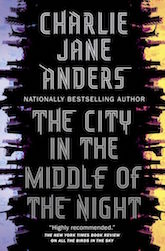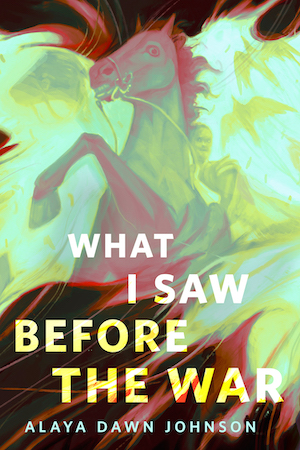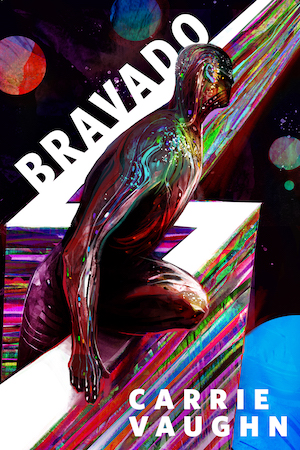We’re back for round two aboard the glorious, out-of-control Tilt-a-Whirl that is Good Omens. My name is Meghan and I’m excited to see you again! Everyone have a good week? Are you ready for more apocalyptic madness? Let’s get the show on the road!
Summary
Anathema Device is a little girl who knows what’s up, thanks to the book written by her ancestor, Agnes Nutter. This book spells out everything that’s going to happen in the world, right up until the apocalypse. Anathema isn’t overly concerned about that, though; she mostly likes seeing where her name pops up. For now, she reads under the covers with a flashlight, like all children do, and flips through the old tome.
Picking up where we left him in the last installment, Crowley drives away from the hospital, chewing over the gravity of the events he’s just set in motion. As a demon, he’s in favor of the apocalypse in theory, of course. The real thing, though? Maybe not. He thought he’d have more time. He’s been coasting on his demonic duties as well—why bother giving it a 100% when humans can do so much worse to each other than he could? He once ended up getting special commendation for the Spanish Inquisition even though he was just in the area for a bit of vacation at the time. His frenemy the angel Aziraphale tried to explain humanity to him but the lesson didn’t take. And speaking of Aziraphale…Crowley veers down the road and decides to make a very important call.
Meanwhile, Mr. Young is still being subjected to the chattering onslaught of Sister Mary Loquacious. Baby names are hard at the best of times (hell, I know someone who took a solid two months to name a dog) and Mr. Young keeps shooting down all her suggestions. That is, until a classic emerges. What about Adam? Mr. Young mulls this over. Adam might do just fine…
Elsewhere, a young Newton Pulsifer is working late into the night. His experiment with electricity goes very well: this time he only blows the power to his house and not to the whole town. Yes, indeed, he’s really improving! He’s convinced his future lies in the realm of electricity and computers. If only they would stop breaking around him. Then again, Agnes Nutter’s book may have something to say about that.
Aziraphale and Crowley talk in a park about how awful the apocalypse will be for each side. Heaven would be insufferable and smug while Hell… the less said about that the better. Aziraphale tries valiantly to uphold Heaven’s line of reasoning but he has to admit that Crowley has a point. The end of the world would be miserable for everyone. No more nice restaurants or lovely books, no more good music and charming little shops. The angel’s resolve cracks under that logic and together they agree that something must be done. Their hands are tied, though. Neither can disobey their masters or be seen to be helping the other. So, they decide to hedge their bets…and get drunk.
They discuss the nature of time, of how tasteless Heaven is (The Sound of Music for all eternity!), and a little bird that has to go a bloody great way to sharpen its beak on a mountain. Aziraphale is agonized. Heaven sounds like Hell, when you get right down to it. Crowley has a plan, though. They decide to thwart each other and use their infernal and divine influences on the child, hoping to make him grow up a certain way. And, just maybe, they’ll cancel each other out and nothing at all will happen. It’s worth a shot, at least. After all, they have everything to lose.
Leaving Aziraphale and Crowley to plot, the other big players begin to make their way to the fore. A woman named Scarlett is selling illegal arms in the midst of a small civil war that she hopes will become a massive one. She skips town, ready for a holiday, leaving behind blood and strife in her wake. A man named Sable is relaxing in a restaurant, going over figures for his new cookbook. People lose weight simply by not eating. It’s a bestseller. A skeleton calling herself a fashion model asks him to sign her book and he does so with a flourish, proud of his accomplishments. There is also Mr. White—he’s as nondescript as they get, going unnoticed while doing odd jobs in places like Chernobyl and Three Mile Island. Currently he’s working on an oil tanker headed to Japan. Tragedy strikes somehow and the oil floods out of the ship, polluting the ocean and killing all the wildlife. There is a final member of this happy band, but he (it?) is nameless and very, very busy.
The American diplomat’s baby son has been named Warlock and soon has a household full of people attending to his every need. There is a rather devilish nanny and a kindly gardener. As he grows up, he is educated by two tutors, one who teaches him about dictators and warlords and another who points him toward studying artists and civil rights leaders. They both read to him from the Book of Revelation. Warlock doesn’t seem bothered one way or another about this odd curriculum, leaving Crowley concerned. Surely by now the child would have shown an aptitude in one direction or another. Something is wrong, but what could it be?
Commentary
Hoo boy, and we are off to the races! The babies have been switched, time marches on, and Aziraphale and Crowley make some rather important decisions. We are introduced to characters who will be extremely important later, like Anathema and the four horsemen. There’s also some delightful little background information about Aziraphale’s rare book collection and how Agnes Nutter’s book of prophecy came to be. Gaiman and Pratchett leave no stone unturned. We get the history for everything in this book.
One of my favorite bits is the care and detail that goes into the long running joke about spies feeding ducks. Members of MI5, the CIA, and the KGB all swapping information while wearing sleek raincoats and tossing bread to very discerning ducks. It’s one of those moments that just makes so much sense. Who goes out specifically to feed ducks? Have you? I certainly haven’t. Must be spies. Of course! Case closed.
Buy the Book


The City in the Middle of the Night
Crowley is incredibly good at not so much directly tempting Aziraphale but letting him see for himself how the arguments on the angelic side are less than perfect. Aziraphale is very precise and has excellent taste. An eternity with only movie musicals filled with nuns and singing children sounds particularly horrible, apparently. It reminds me of the “Harmony Hut” scene in Addams Family Values. You’re trapped in a hellscape of cheerful pastels and charmingly saccharine films. No wonder it scares Aziraphale so much. Could you imagine spending eternity locked in the Harmony Hut?
The Four Horsemen are also impressively and slyly introduced. Each gets only a small number of pages, but they make a huge impact. They’re personified so perfectly. Famine is the one who also seems the most plausible, even today, given how many kooky, literally killer diet trends are out there. If this book had been written in 2018, Famine would be an Instagram influencer peddling bogus “slimming teas” and juice detoxes.
Also, drunk Crowley and Aziraphale are an absolute delight, and I sincerely hope that scene makes it into the show. I still wonder if they’re going to update the action for 2018, or if it will stay firmly set in the ’90s. The trailer doesn’t really offer us a clue one way or another. Part of me has my fingers crossed, rooting for the ’90s. This is a story that should exist before the internet and smartphones became omnipresent. Then again, can you imagine how on point Crowley’s Twitter feed would be?
Pun Corner
Yes, my friends, it’s time for another trip to Pun Corner:
Aziraphale beamed.
“You know, I’d never have thought of that,” he said. “Godfathers. Well, I’ll be damned.”
“It’s not too bad,” said Crowley, “when you get used to it.”
Boom: perfect set up, then Crowley knocks it out of the park. A+ work, everyone.
(In the footnote in Scarlett’s section): “Nominally a city. It was the size of an English county town, or, translated into American terms, a shopping mall.” Ouch. Valid, but ouch.
“Aziraphale popped another deviled egg into his mouth, and washed it down with coffee.” And then, a moment later, “Aziraphale helped himself to Crowley’s slice of angel cake.”So, you’re telling me that the the angel is eating deviled eggs and the demon is having angel cake? This book is too good and too pure for this world, guys. It’s too perfect. Two little sentences about snacks express more about these two and their relationship than ten thousand words could. Also, Aziraphale, taking something from another’s plate? What happened to “Thou shalt not steal”?
This was a fantastic section of the book, and it only keeps getting better. Next week we get to “Wednesday” and meet the fearsome hellhound who will join the Antichrist. Make sure to read the entire “Wednesday” chapter, pages 73 to 126 in the paperback edition—if you hit “Thursday,” you’ve gone too far! I’ll see you all next Monday for Part Three!
Meghan Ball is an avid reader, writer, and lifelong fan of science fiction and fantasy. When she isn’t losing to a video game or playing the guitar badly, she’s writing short fiction and spending way too much time on Twitter. You can find her there @EldritchGirl. She currently lives in a weird part of New Jersey.










The traffic warden bit- Crowley disappears his wheel clamps, and Aziraphale sets the ticket book on fire. Both think the ‘other side’ invented traffic wardens.
Really enjoying this reread! I just had my first child 2 weeks ago and have been reading Good Omens to her during our late night/early morning feeding/hangout sessions.
No reference to the Buggre Alle This Bible? Probably my favorite throwaway gag in the book.
One of the things I’m really looking forward to is the adaptation of the Horesepersons for the modern times, in much the same way that they did for American Gods. Is War going to be a hawkish blonde Fox News Type? Is Pollution going to be constantly secreting microplastics? I think Famine and of course… the other one… are relatively good as they are.
Aziraphale and Crowley are my favorite campy gay couple. A posh lunch and talking about business, I would read an ongoing series about them just catching up week to week.
There’s so many great lines and little moments in this section, but I’ve always loved the fact that “The Golden Girls” is mentioned as one of Crowley’s favorite shows. It just makes me so happy to imagine him with his feet up, eating cheesecake angel cake and cackling at the one-liners :)
I also loved the Buggre All This bible like #3. I’ve done typesetting and it’s so accurate in the sense of a very time consuming task that gets almost nowhere over hours yet needs to be done. The running gag of spies doing transfers everywhere is also never not funny.
The ducks in St James park was really funny, especially because they remind me of my own dogs (labradors) who are trained like that and come running if certain sequences of events happen.
The bit where Crowley contemplates various ways to ensure only his chosen nanny arrives to be interviewed, finally settling on a “wildcat tube strike” for some reason tickles my funny bone :-)
Enjoying the re-read, the hardest part of course being stopping, but seeing what the other participants found funny is interesting so I shall persevere in putting the brakes on ;-)
I sometimes go to feed the ducks down by the pond. I think you have to live somewhere with a pond to get the duck thing. If you have a river or a canal then you get swans turning up instead of ducks and those things are vicious.
Or seagulls. That’s a mistake you only make once, one way or another.
Rant-lecture-headcanon-fest first:
I hate the Horsepersons. Hate, not loathe. If I loathed them, I would avoid thinking about them. As Pratchett said in the Discworld books, hate is the opposite of love and just as attractive. I’m obsessed with them.
They’re so real, so believable. I see their handiwork in the news every day. Therein lies their demonic temptation to readers. It’s so easy to blame them as the guiding force behind all of our horrible, irrational, self-destructive pursuits – even though Crowley squarely blames humanity for the worst of our atrocities right here.
War may have it easiest, as she is never unpopular. She inflames our inborn aggression, lust, possessiveness, and prejudice, and then guides us to take it out on each other. She arms the angry and angers the armed. The people most harmed by wars may hate her, but they’re not the ones she persuades. As the saying goes, “When elephants fight, it’s the grass that suffers.”
Famine…the old black fox has had the longest experience in deceit. Unlike War, he makes us go against our deepest drive – to feed ourselves and our people. Here we see his success at persuading individuals to voluntarily starve themselves, an impressive accomplishment. But I headcanon that he also guides – and has always guided – governments, farmers etc. toward methods of food production and distribution that lead to massive waste, unequal access, and destruction, even in the best of times, and immense vulnerability to things going wrong, e.g. dependence on monocultures like Ireland’s blight-stricken potatoes. It appears that he doesn’t actually create the droughts, floods etc. that often destroy food systems (though Pollution eventually managed to do that with climate change), but he guides humans into practices that greatly magnify their impacts.
Pollution is the youngest, but he learns fast. He’s seldom admired, though Janine Benyus wrote of possessing a rubberstamp bearing “downright heroic-looking smokestacks,” a triumph of industrial glorification. He mostly works quietly to cause durable destruction and then evades the blame for it, as we see here. I’m sure Famine taught him the art of strategic retreat, replacing vilified chemicals or technologies with equally nasty ones, leaving people with no choice that isn’t destructive, so our every day is a tithe to him even when we know he’ll one day kill us. I hate him far more than the others, for he has most personally threatened me and mine.
I have little to say about the other currently-acknowledged Horseperson, as his on-page actions are briefer and less malicious.
All that said, I didn’t hate them at this point in my first read. They truly became nightmares and monsters when they pushed those buttons.
Incidentally, and this is a fact, one man had a major role in inventing leaded gasoline and some of the first chloroflourocarbons, among other things. He then developed polio, invented a mobility-assistance machine, and was killed by it. I think of him as an agent of Pollution, helpfully removed by not-retired Pestilence before his improbable track record could incite suspicion.